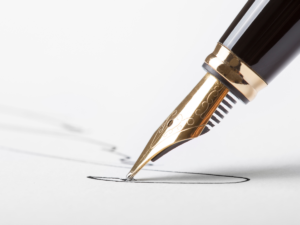Collateral for bail is usually needed for higher-than-usual amounts. When someone is arrested and taken to jail, they usually have the option of posting bail to be released until their court date. Bail is set by a judge and the amount is usually based on the charges, the defendant’s criminal history, and whether they are considered a flight risk.
When do you need collateral for bail?
Collateral is usually needed when the total bail amount is very high and you’re going to start a payment plan with your bail bondsman. When the 15% required per NRS 697.300 is still too high, the bail bondsman may ask for additional co-signers and/or collateral (in some cases, you need both).
The most common things you can put down as collateral are usually a car title or the deed to a house, as long as the value of the property is the same as the full bail amount, (not just the 15% percent premium).
The property you use as collateral can be owned by the co-signer or the defendant and the value must be equal to or more than the full bail amount. If the defendant does not have any collateral or property, you can look for a co-signer who is willing to sign a contract promising to pay the full bail if the defendant fails to appear in court or is a flight risk. While collateral can be helpful in ensuring that the defendant shows up for his or her hearing, it can also be a significant financial burden for defendants who are already struggling. Therefore, it is important to consider all options before posting bail.
To learn more about the obligations of a co-signer, check out this article.
Why do I need to put down collateral?
At the end of the day, a bail bond company is like a lender, and even though you only have to pay 15%, the bail bond company is letting you borrow the full amount of the bond. That being said, imagine lending thousands of dollars to a stranger and there is no guarantee that they will pay you back. For this reason and to ensure that the defendant goes to his or her court hearings, collateral is needed until the court exonerates the bond.
What is a bond exoneration?
Bond exoneration is the termination of the bond’s obligation and refers to the process through which the person or company that posted the bond can get their money back. When you hire a bail bondsman to get someone out of jail, the bail bondsman gets the money back, not you. In all cases, you are still required to pay any outstanding balance owed to the bail bondsman. If you had already paid the 15% prior to the exoneration, you would not have any further obligations.
The most common ways in which a bond is exonerated are by court order, when the prosecutor doesn’t file charges (DA denial), when a defense attorney files a motion, during sentencing, or when the case is dismissed.
What happens to my property when I use it as collateral?
If you put down property as collateral, the bail bondsman holds the title to your property until the bond is exonerated. After the exoneration, your title or deed will be returned to you as long as you have finished paying the 15%. A bond exoneration does not mean that your obligations to the bonding company are over. Many people believe that they can stop paying when the bond is exonerated, but this is not true; the bond exoneration and your obligations are two separate things.
If you still have questions about this process, call us at 702-462-9200.




